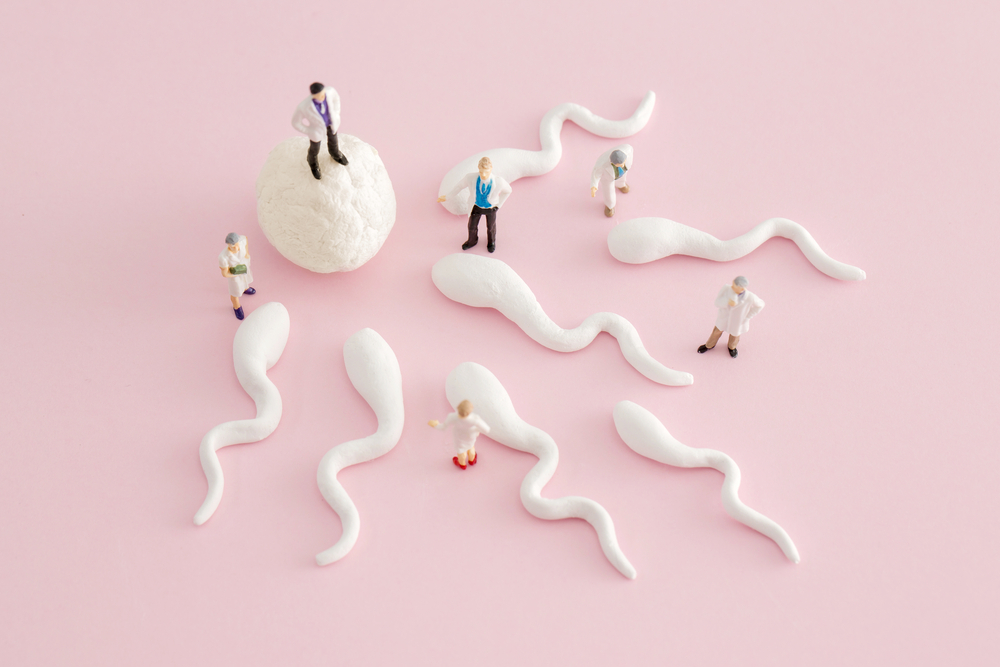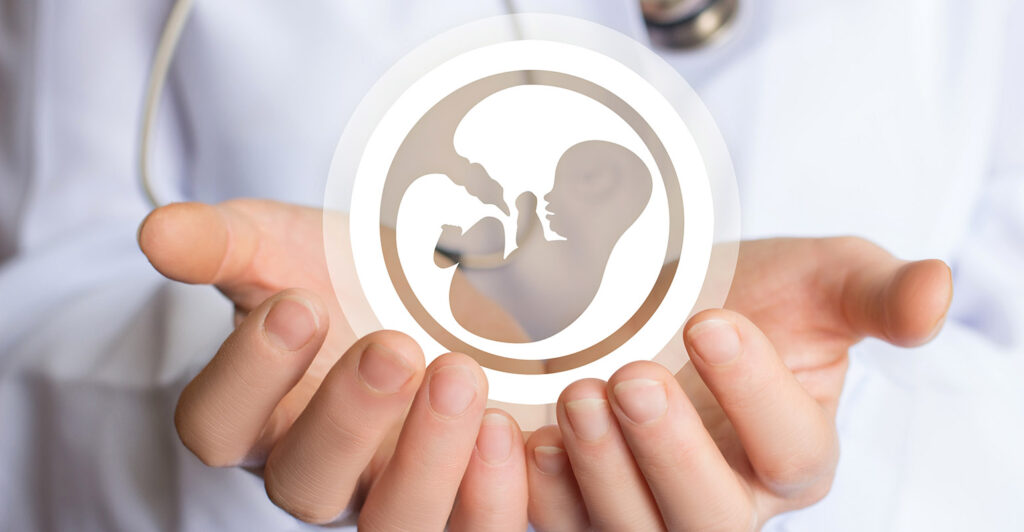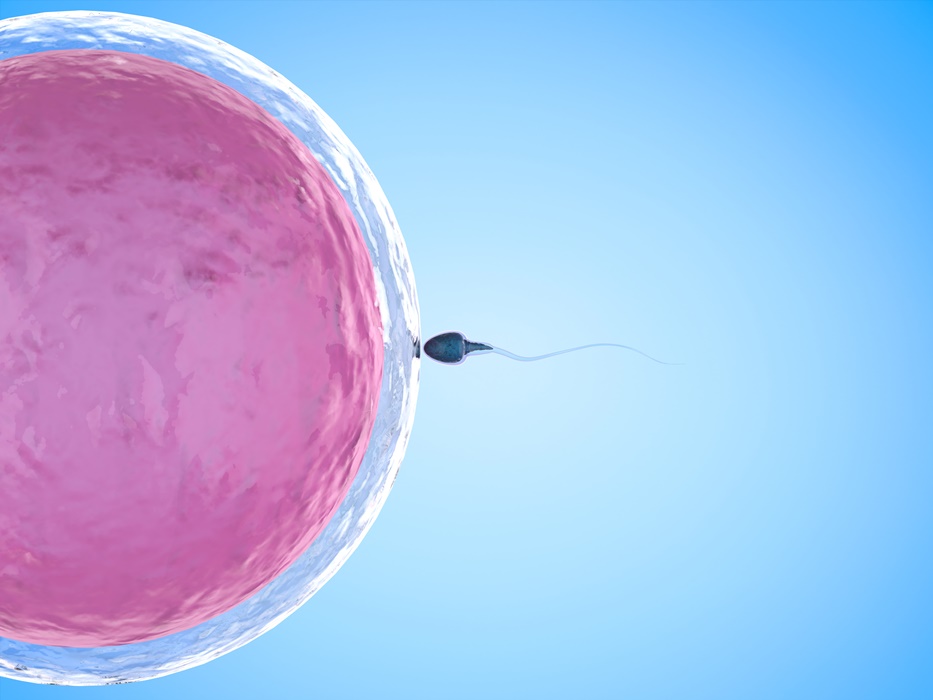A man’s body goes through dramatic physical changes throughout his lifetime, particularly when it comes to testosterone. As you age, your testosterone levels naturally decrease. However, if they drop too much (especially if your levels decrease earlier than expected), you could experience a range of problems and a decreased quality of life. Many men turn to testosterone replacement therapy (TRT) to address this issue. While this treatment can provide a lot of benefits, it still poses risks.
Some men using TRT experience a decrease in sperm count, which can pose issues for those who are trying to conceive. Does TRT make you infertile, and what can you do to improve your odds of having a baby? There are several steps you can take before starting TRT which may help preserve your fertility, including freezing sperm, using clomiphene/enclomiphene alone, and combining Testosterone with HCG. Keep reading to learn more about low testosterone, infertility, TRT, and a few ways you can minimize its impact on your fertility.
The Impact Of Low Testosterone
Everyone’s bodies produce testosterone, a hormone responsible for playing a role in puberty, libido, and fertility. It can also impact physical traits including body hair, muscle mass, strength, and bone mass. For men, the testes produce most of the body’s testosterone.
Men typically have higher testosterone levels than women, but T levels fluctuate frequently based on your body’s needs. Overall testosterone levels change over time too, decreasing with age and causing unwanted side effects. Low testosterone can reduce your quality of life and result in symptoms like:
- Erectile dysfunction (ED)
- Decreased libido
- Diminished muscle mass
- Less body hair growth
- Fatigue
- Irritability
- Depressed symptoms
If you suspect your testosterone levels may be low, talk to a medical provider at Alpha Hormones. They can test your T levels or recommend an at-home test, analyze the results, and let you know how to proceed. They may suggest making lifestyle changes, like a healthy diet and increased exercise, or trying a treatment like testosterone replacement therapy to help increase your testosterone levels.
The Relationship Between Low Testosterone and Fertility

If you’re trying to have a baby, you may believe that low testosterone levels are to blame. In reality, the reason may be more complicated than that. For some, low testosterone levels can lead to a decrease in sperm production and fertility. Testosterone is just one of the hormones that stimulate sperm production, but there are a few other hormones that play a role too. As such, low testosterone does not necessarily mean you are infertile, and it doesn’t cause infertility. Testosterone levels in the testes are usually high enough to produce enough effective sperm to allow you to conceive normally, even if you have low T.
However, low testosterone levels can still impact your ability to conceive a child. Why? Because low T can cause ED and decrease your sex drive–two factors that are essential when trying for a baby. So, even if your sperm levels are normal, low T can still affect your ability to conceive and make it more difficult.
When you are diagnosed with low T, your medical provider will often recommend that you start hormone therapy as soon as possible. If you’re having fertility issues, they may run tests to check your sperm levels as well. With this information, they’ll be able to address the two separate—yet interconnected—problems.
How Can TRT Affect Your Fertility?
While TRT can be effective at raising your testosterone levels, it can lead to other issues especially when it comes to your fertility. One of the most common side effects of testosterone replacement therapy is a decreased sperm count.
To understand why this occurs, we must first look at how the body produces sperm in the first place. A complicated collection of hormones triggers sperm production. Ordinarily, when your body registers that testosterone levels are low, it sends a signal to the pituitary gland. This prompts the production of two essential hormones: luteinizing hormone (LH) and follicle-stimulating hormone (FSH). This process triggers the testes to begin producing sperm.
When your brain registers an influx of testosterone from TRT treatment, it disrupts the standard sperm production process. Since the body doesn’t register low T levels, the pituitary gland doesn’t produce the necessary hormones and sperm production decreases. So, does TRT make you infertile? A lower sperm count does not necessarily equate to infertility, but it can make it harder for you to conceive.
There is no singular timeline to suggest when you’ll notice a drop in sperm count while on TRT. Everyone’s body is different; some may experience the effect on their fertility faster than others. Other people may experience a gradual decline in sperm count. When you will experience this side effect depends largely on how quickly and how well your body reacts to the new inflow of testosterone.
Is the Impact of Testosterone on your Sperm Count Permanent?
Does TRT make you infertile forever? It shouldn’t–while testosterone replacement therapy can often cause infertility, in most cases, it is not permanent. Infertility is reversible but it will be very costly to fix it. Fertility treatment cost can sometime be in the tens or hundreds of thousands of dollars so it’s best to try and prevent it whenever possible. When TRT is stopped, infertility (and your testosterone levels) usually reverts back to where it was when you began treatment. However, for a very small percentage of TRT users, fertility does not return after stopping TRT. Keep in mind that you should only discontinue TRT under medical guidance.
Usually, sperm levels return to pre-testosterone replacement therapy levels within one year of ceasing TRT. Typically, the less time you’ve been on TRT, the more likely you’ll be able to reverse its effects. The amount of time needed for fertility to be regained also depends on factors like how long you were on TRT, what type of dose you were on, and how old you are. A younger man who was using TRT for a short period will bounce back faster than an older person who has been receiving treatment for a long time.
Should You Stop Using TRT If You Want Children?

First, you should never discontinue your TRT without first talking to a medical professional. They can help you determine the best course of action to address your low T while protecting your fertility.
While stopping TRT is one way to protect your fertility, it’s not the only option. There are a few methods you can use to ensure you’ll be able to have kids when you’re ready. This may include freezing sperm before starting treatment, trying a different kind of treatment for low T, or combining Testosterone with HCG to protect your fertility. You can read a bit more about your options below.
Discuss Long-Term Goals with Your Doctor Before Starting TRT
Before starting testosterone replacement therapy, it’s important to discuss your long-term goals with your doctor or a hormone expert. Consider whether you want to become a father relatively soon or only several years in the future. Whether you’re heterosexual or homosexual considering intra-vitro fertilization (IVF), intrauterine insemination (IUI) or surrogacy, talk to a medical provider at Alpha Hormones about the risks of TRT for infertility and how it might affect sperm production, and possible treatment options.
The medical provider may run some tests to check your current sperm levels and discover the root cause of your low T and infertility. With this information, they’ll be better able to meet your needs. If you are planning to have children or unsure about fatherhood, they can help you find the best way to address your low testosterone while ensuring you’ll be able to conceive without difficulty.
Cryopreservation and Freeze Your Sperm
Freezing sperm is a great way to ensure you’ll be able to have a child when you’re ready to and protect your family’s future or want to leave a legacy. This process is also sometimes referred to as cryopreservation. Hopeful fathers can preserve a sperm sample before starting testosterone replacement therapy or, if your levels are still healthy and viable, after starting TRT.
Experts recommend freezing at least two samples in multi vials. These samples are analyzed by healthcare professionals and specialized labs to ensure they’re healthy and that there is enough to freeze. Once frozen, your samples will remain viable indefinitely– as long as the freezing conditions remain constant. When freezing sperm, you can store your samples for as long as you need to until you’re ready to start a family. You may consider storing your sperm with multiple companies to ensure there is no mishap in the process of withdrawing your samples for fertilization.
Use HCG with TRT
When you combine TRT with other treatments, you can combat the negative side effects of TRT (like low sperm counts and testicular shrinkage). One such treatment is HCG. HCG, or human chorionic gonadotropin, stimulates the testicles to produce more testosterone. HCG acts similarly to a luteinizing hormone (LH), which is vital to sperm production. HCG usually comes in two vials: one is a diluent usually consists of bacteriostatic water or one is powder. It’s mixed together and inject subcutaneously with a small insulin syringe. HCG needs to be refrigerated after each usage or it can lose its potency or efficacy. The dosage varies depending on the patient.
Testosterone and HCG can be used to treat low testosterone levels in men with hypogonadism. This is a condition where the body doesn’t make enough natural hormones to function normally. Men with low T can use Testosterone and HCG together to improve their testosterone levels, increase testicular size, and maintain fertility. HCG is not 100% in preventing infertility, but it’s better than not using it at all with TRT. Hence, it’s better to freeze your sperm and use testosterone with HCG at the same time for your low testosterone treatment to decrease your infertility risk.
Try Clomiphene or Enclomiphene Instead of TRT
Testosterone replacement therapy isn’t your only option for increasing your testosterone levels. Your doctor may recommend an alternative treatment like clomiphene citrate instead. Clomiphene or enclomiphene is a fertility drug that can treat infertility in men and women. The drug works by regulating the estrogen system and prompting your body to produce more LH and FSH to promote sperm production. This medicine can also boost testosterone and treat low T symptoms like low libido and erectile dysfunction. It’s taken oral unlike HCG which is mainly administered via subcutaneously injections. Clomiphene or enclomiphene is also very affordable and not a controlled substance like testosterone and HCG so your medical provider can easily e-prescribe to your local pharmacy if indicated.
Because clomiphene or enclomiphene isn’t a steroid or hormone, it won’t cause the same side effects as TRT while you’re taking it. In fact, this pill has very few side effects, most of which can be avoided with the right dose. If you’re concerned about the risks associated with TRT, this alternative option could be right for you!
It’s important to note that clomiphene doesn’t work for everyone. It may also take longer to work than regular TRT. Some men have found it to be less effective than TRT, especially for older men and those with compounding health problems. It can be used alone or in conjunction with HCG. Using both at the same time can increase your testosterone levels higher and increase sperm production than used alone. If you’re planning on trying any other fertility drugs (i.e., recombinant FSH or even gonadorelin), talk to a medical provider at Alpha Hormones first!
Treat the Cause of Your Infertility
Does TRT make you infertile? Yes, it could possibly have that effect on some men. However, it’s possible that your fertility problems are unrelated to your low testosterone levels or TRT. Along with aging, low testosterone can be caused by a variety of health conditions, including:
- Hypothalamic disease
- Pituitary disease
- Delayed puberty
- Testicular damage
- Noncancerous pituitary tumor
- Genetic conditions like Klinefelter syndrome, myotonic dystrophy, and Kallmann syndrome
If your low T is caused by something other than aging, your medical provider may be able to treat the underlying cause, improve your T levels without TRT, and protect your fertility. It’s best to talk to a physician that specializes in TRT or a reproductive specialist.
Preventing Infertility Risk with TRT
You can take steps to preserve fertility while undergoing TRT, such as freezing sperm samples ahead of time or asking your doctor about possible side effects before starting treatment. If you have concerns about the possibility of infertility from taking TRT, talk to one of Alpha Hormones medical providers before starting hormone therapy.
As we’ve seen, there are many reasons why infertility can develop, and the causes are different for each person. In some cases, low T and TRT can make it harder to get pregnant because it causes erectile dysfunction, low libido, or decreased sperm counts. If you want to start TRT but don’t want this risk, there are still options available: freezing samples of sperm before starting treatment or taking clomiphene/enclomiphene and/or HCG instead of testosterone. Just remember that they won’t work if your underlying medical cause isn’t diagnosed first!
To get started with hormone therapy and to decrease your infertility risk while on TRT, consult with one of Alpha Hormones medical providers.













4 Responses
Thanks for sharing!
Enjoyed every bit of your post.Much thanks again. Awesome.
Thank you for the awesome content, it’s always appreciated
From start to finish, your content is simply amazing. You have a talent for making complex topics easy to understand and I always come away with valuable insights.